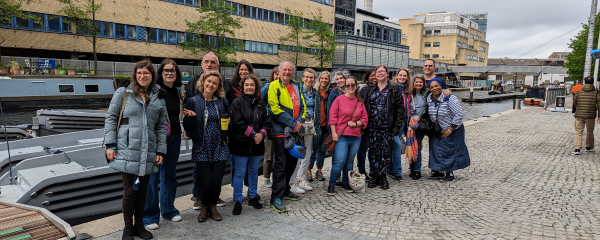
Happy’s 4 Day Week: You Should Try it Too! (18 Month Update)
Happy's 4 Day Week has been running now for 18 months. Happy's Founder and Chief Happiness Officer Henry Stewart looks back at how things have progressed and the impact it has had so far.
Here you can find all of Happy’s blog posts, covering our Excel hints and tips, ideas for creating happy workplaces, and ways to be more productive at work — and more.

Happy's 4 Day Week has been running now for 18 months. Happy's Founder and Chief Happiness Officer Henry Stewart looks back at how things have progressed and the impact it has had so far.

Communicating across differences such as culture, experience and background is an essential skill to develop when dealing with people in a work or even a personal environment. Understanding what makes us different and unique is essential to building trust and developing teamwork. Read more in this blog written by Marwa Farouq.

When making a change it is always important to consider how it will impact others. There are those impacted that may be able to directly influence, help or hinder you along the way in making these changes - the stakeholders. In this blog Rachael talks about the need to communicate and engage with these potential stakeholders to help ensure the changes you are making can take place smoothly and productively.

In The Happy Manifesto, Henry Stewart emphasises that it is important to have a ‘positive growth-oriented mindset’ when receiving feedback, and here are a few suggestions to help you to foster that and learn to use feedback at work as a useful tool to build your career.

I have asked thousands of people when they work at their best. For over 90% of them it has been when they have been given the trust and freedom to make their own decisions. I have also asked whether they like “complete freedom” or “freedom within guidelines”. While there are a few anarchists who like complete freedom (especially entrepreneurs) most people – again roughly 90% - choose freedom within guidelines.

What I love about Nonviolent Communication (NVC) is it enables me to let go of any judgement or fear of punishment. It enables me to ground myself in a world that is beyond right and wrong, beyond good and bad. It enables a deep understanding of myself and others. Read more in this blog written by Marwa Farouq.

Alex Soojung-Kim Pang is one of our speakers at the online Happy Workplaces Conference on 15th June. He is a key player in the four-day work week movement and has also written a book called Shorter about that topic. At the conference, he will be talking about his first book, Rest: Why You Get More Done When You Work Less. “Long hours are an expression of our identity and proof of our seriousness,” Alex suggests. “They don’t necessarily make us more productive; they make us look more productive.”

I recently did a podcast with Liz Wiseman, the author of Multipliers: How the Best Leaders Make Everyone Smarter (and Impact Players). Her book, Multipliers, has had a transformational impact on Happy and on our programmes. All of our ‘people managers’ are Multipliers, who enable their people to do their best work, and we’ve began training others on how to be a Multiplier on our leadership programmes.

In The Happy Manifesto, Henry Stewart emphasises that it is important to have a ‘positive growth-oriented mindset’ when receiving feedback, and here are a few suggestions to help you to foster that and learn to use feedback at work as a useful tool to build your career.

The first attendees of our Level 7 Senior Leadership programme have just completed their studies. The Level 7 programme is the equivalent of a post-graduate degree or MBA. In this blog, Henry speaks to people who attended the programme and how it changed both their leadership style and their organisation.